ZAGREB October 23, 2020 - Preserved by Zagreb's Croatia Records, the vast archive of giant Yugoslavian music label Jugoton throws up some incredible surprises on the newly released Croatia Records Jugoton Funk Vol. 1
James Brown, Funkadelic, Sly & The Family Stone, Fela Kuti - when you think of funk music, it's black artists that usually come to mind. Although, not if you're Croatian. One of the country's best-loved (and most missed) musicians, Dino Dvornik, was often referred to as the King Of Croatian Funk - his electro explorations in the genre during the early 90s were so innovative they don't sound out of place on dancefloors today. But, though he here might be known as the king of this style, Dino Dvornik was far from the first to record funk music in Croatia.
Marijan Kašaj - Ideja
One of the highlights of Croatia Records Jugoton Funk Vol. 1. Although a classically trained opera singer, Zagreb's Marijan Kašaj expressed a much more rough vocal style when singing rock music, notably as the frontman of the band Grešnici (The Sinners). This song comes only from a rare 45 single and was composed and arranged by Vladimir Delač
The recently released Croatia Records Jugoton Funk Vol. 1 compilation finally lifts the lid on the largely untold history of homegrown Croatian funk music. Culled from the darkest depths of the gargantuan Croatia Records Jugoton archive in Dubrava, this collection tells a story of ambitious musicians joyfully creating some of the wildest sounds to have ever come from these lands. Effortlessly cool and in many cases very surprising, it is a soundtrack that is perhaps even more relevant on today's world stage than when it was made.
Dalibor Brun - Davni život
Rijeka musician Dalibor Brun explored soul and funk music across three solo albums. This track, from his third, features a wild Hammond solo performed by extremely famous Croatian singer and songwriter Oliver Dragojević. “You can hear some funky tracks in Oliver's own back catalogue, but to find him playing such a wild style as a session musician on Dalibor Brun's track is a very unexpected,” says Dr. Smeđi Šećer. “At the time of these recordings, some of these artists were already well established, so they could afford to collaborate and experiment as they wished.”
“Most of Jugoton's output was pop and folk music,” Croatia Records Jugoton Funk Vol. 1's Dr. Smeđi Šećer tells TCN. Alongside co-compiler, Zagreb's Višeslav Laboš, this Rijeka DJ is part of a small scene of enthusiasts who have been reviving the ex-Yu funk sound over recent years - online, on mixtapes and at niche club nights. “These are mostly very obscure releases. You would have to go looking around secondhand record shops for maybe 10 years to find all of these.”
Igor Savin - Alfa
Son of prominent Croatian conductor, composer and opera director Dragutin Savin (longtime director of the Osijek Opera), Igor Savin is a pianist, vibraphonist, composer, arranger and producer who studied at the Theoretical Department of the Academy of Music in Zagreb. He continued his studies by one of the first Croatian students at the prestigious American College of Contemporary Music Industry Berklee College of Music in Boston where he studied harmony, improvisation and composition. As an eighteen-year-old, he founded his first jazz band. He played piano and vibraphone in symphony, studio and festival orchestras, and in the Big Band of HRT. He is the author of music for numerous films, cartoons, television shows, theatre plays and often used melodies from Balkan folk music to inspire his jazz and contemporary classical pieces. In 1984, he founded the electronic studio of the Vatroslav Lisinski Concert Hall.
Time spent rifling through secondhand shops for old, forgotten and obscure music is a pastime known as digging. A phenomenon popularised since the birth of American hip hop in the 1980s, it has been responsible for turning the music of the past into some of the most-contemporary sounds we hear on today's radio or dancefloors. Over the last four decades, countless soul, R&B and hip hop stars have sampled older music to create chart-topping hits. Digging for vintage sounds has subsequently become a global trade. Obsessives Dr. Smeđi Šećer and Višeslav Laboš are two of the best-informed that search for contemporary-relevant sounds in the back catalogues of Balkan music.
Josipa Lisac - Ležaj od suza
'Ležaj od suza' (A bed of tears) is taken from Croatian megastar Josipa Lisac's classic debut LP 'Dnevnik jedne ljubavi'. It is not the only track on the album which you can hear international funk DJs play in some of the coolest clubs in London, Berlin, Manchester and New York. She is backed here by Jugoton's first prog-rock band, Time, plus the strings and horns section of the HRT Orchestra. The iconic cover art of Lisac's debut album was a photograph taken by Croatian photographer Jozo Ćetković, who also took the photograph of Croatian model Branka Habek which is used to form the cover art of Croatia Records Jugoton Funk Vol. 1
For Croatia Records Jugoton Funk Vol. 1, they've been greatly assisted in their endeavors by Zagreb's Croatia Records. Not always regarded as the hippest supplier of niche sounds like forgotten funk, Croatia Records's careful preservation of the Jugoton back catalogue (which they inherited after the break-up of Yugoslavia), has meant that the entire recorded history of the giant Yugoslav label has been made available not only to album compilers like Smeđi Šećer and Višeslav Laboš, but to all. Over recent years, Croatia Records has embarked on an ambitious project to digitalise the entire Jugoton archive. Containing some 70, 000 music recordings and 14, 000 artifacts, this is no small undertaking.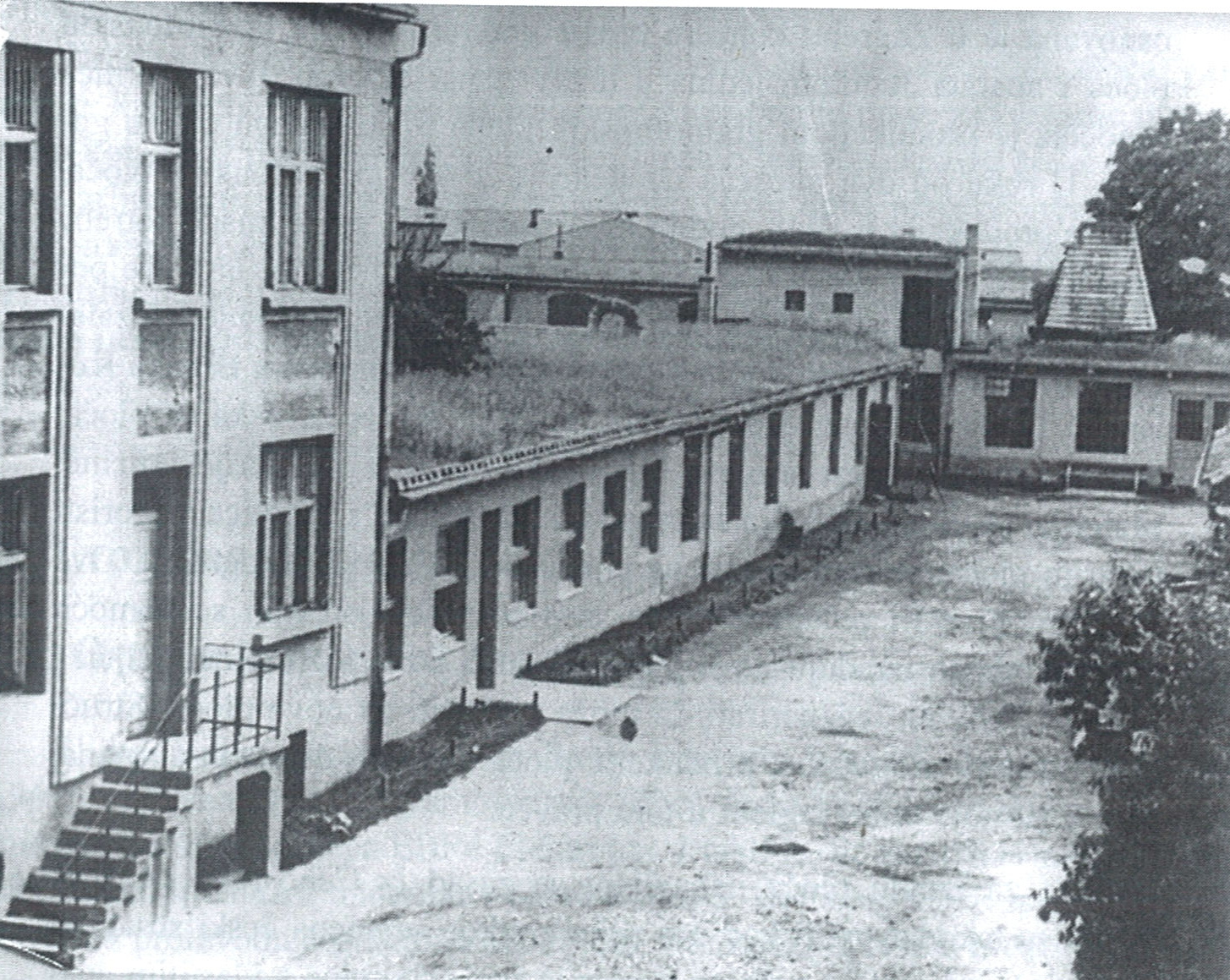 The first Jugoton Records HQ, located at Ilica 213, Zagreb. It subsequently moved to Dubrava, on the site where Croatia Records remains today © Photos from the book History of Vinyl Production in Croatia by Veljko Lipovšćak - provided by Croatia Records
The first Jugoton Records HQ, located at Ilica 213, Zagreb. It subsequently moved to Dubrava, on the site where Croatia Records remains today © Photos from the book History of Vinyl Production in Croatia by Veljko Lipovšćak - provided by Croatia Records
Of all the companies that issued music in the former Yugoslavia, Jugoton was the largest. Based in Dubrava, Zagreb, Jugoton was much more than the type of record label we know today - theirs was an entire industry of culture. Jugoton traces its roots all the way back to the 1930s when it began life as the Elektroton label. After the Second World War, the label was nationalized and renamed Jugoton.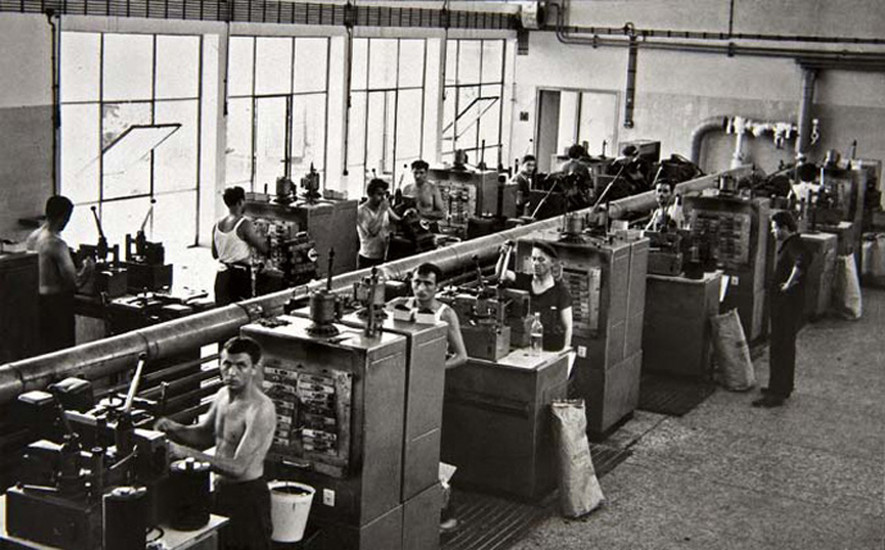
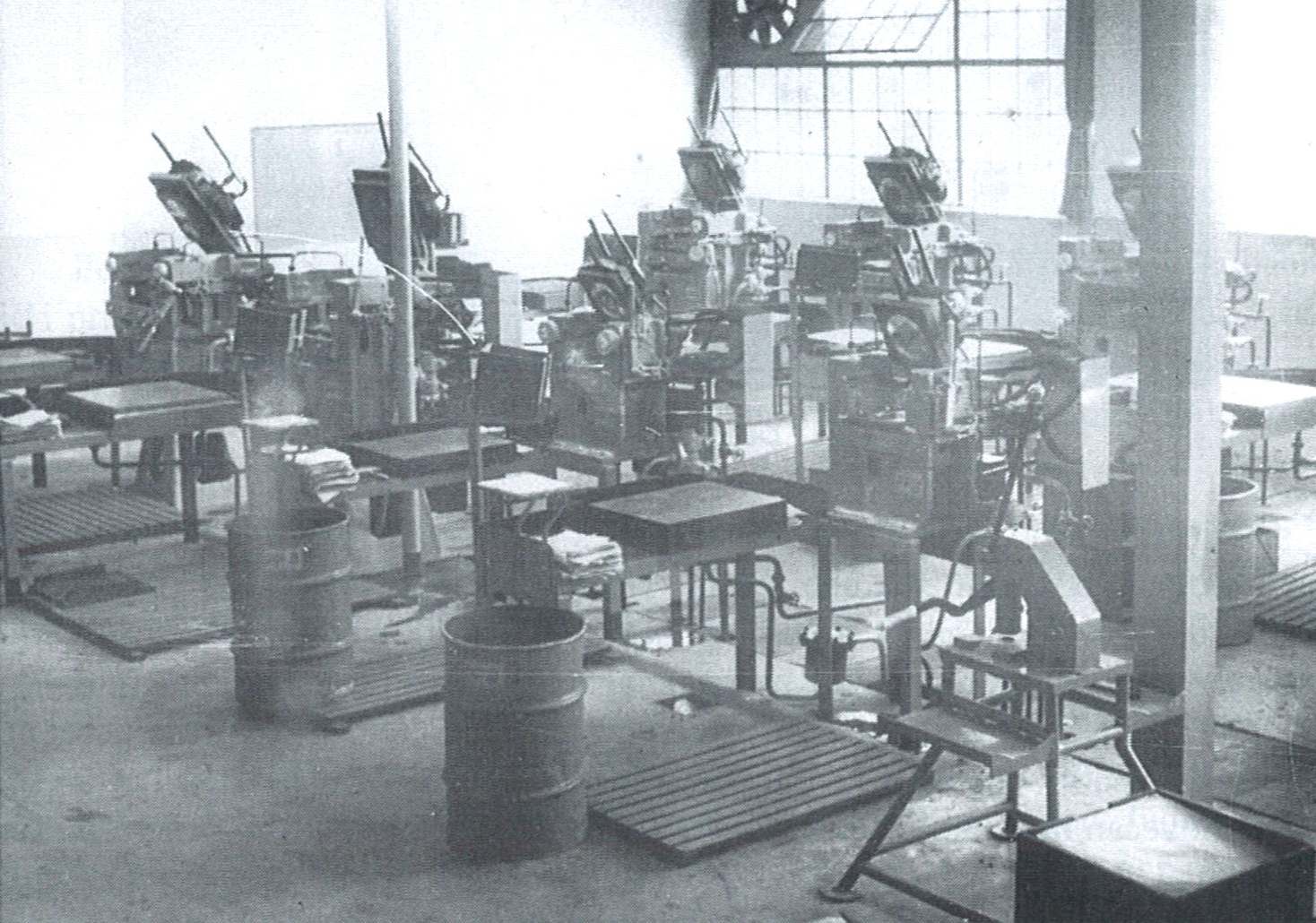 In the two photos above, we can see the Jugoton vinyl pressing factory at two different stages of its evolution © Photos from the book History of Vinyl Production in Croatia by Veljko Lipovšćak - provided by Croatia Records
In the two photos above, we can see the Jugoton vinyl pressing factory at two different stages of its evolution © Photos from the book History of Vinyl Production in Croatia by Veljko Lipovšćak - provided by Croatia Records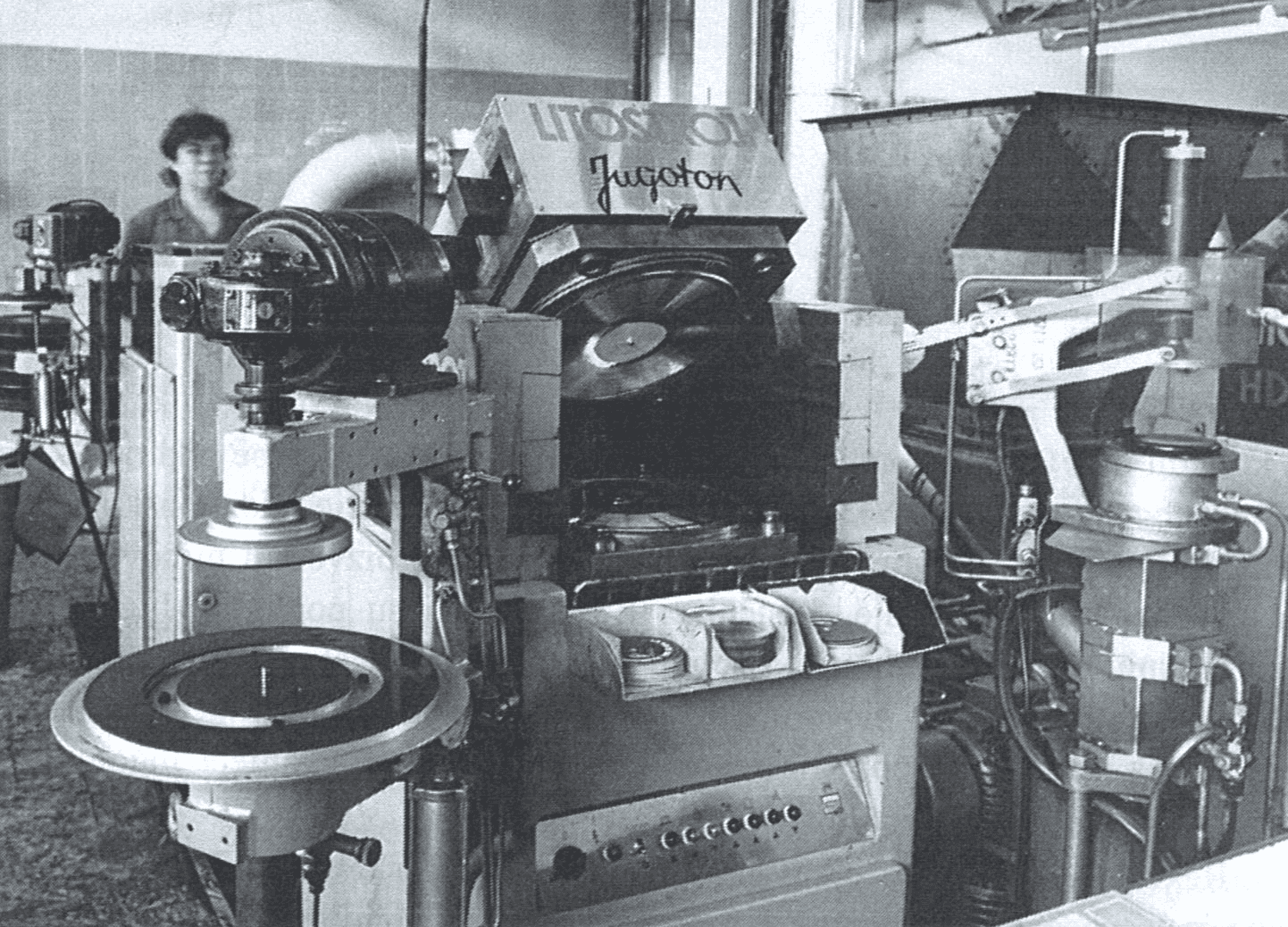 The hydraulic semi-automatic vinyl pressing machine 'Litostroj' at the Jugoton pressing plant 1967 - 1979 © From the book History of Vinyl Production in Croatia by Veljko Lipovšćak - provided by Croatia Records
The hydraulic semi-automatic vinyl pressing machine 'Litostroj' at the Jugoton pressing plant 1967 - 1979 © From the book History of Vinyl Production in Croatia by Veljko Lipovšćak - provided by Croatia Records
At the peak of its influence, Zagreb's Jugoton did more than just sign artists and release music. On the Dubrava site where Croatia Records now stands was a then ultra-modern production studio where famous artists from all over Yugoslavia would come and record. Jugoton made its own discs – at its peak, Jugoton's pressing plant churned out 30, 000 vinyl records every day. By 1982, its decade-old cassette production line made 20,000 units per day. They also owned the largest chain of music stores within the country. As well as the domestic artists signed to Jugoton, the label licensed and released music by some of the biggest artists of the day, including Elvis Presley, The Beatles, The Rolling Stones, Deep Purple and Pink Floyd. Its audience was the 20 million+ inhabitants of Yugoslavia.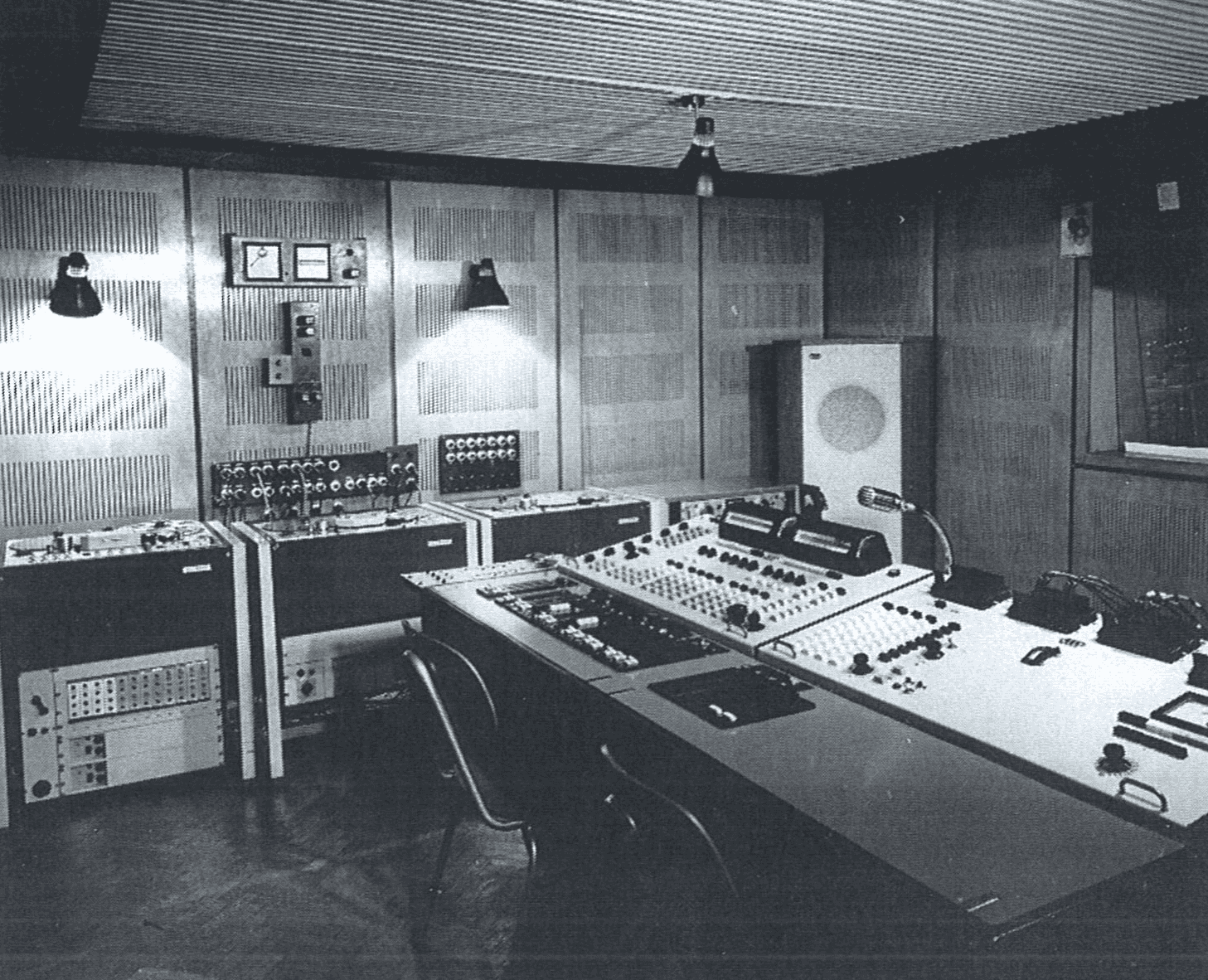 Part of the Jugoton studio set up on the Dubrava site. This specific equipment was in use between 1964 and 1975 © From the book History of Vinyl Production in Croatia by Veljko Lipovšćak - provided by Croatia Records
Part of the Jugoton studio set up on the Dubrava site. This specific equipment was in use between 1964 and 1975 © From the book History of Vinyl Production in Croatia by Veljko Lipovšćak - provided by Croatia Records
Though the music contained in Croatia Records Jugoton Funk Vol. 1 does not sound immediately like the folk and pop music we associate with the label, considering the size of the Croatia Records Jugoton archive it is perhaps less surprising that such anomalies can be found.
“Western music always had a strong appeal in Yugoslavia,” says Dr. Smeđi Šećer. “At the beginning of the communist regime, there was a strong implementation of censorship. But, in the 1960s the (communist) party seemed to relax and allow some western influences through. From this decade, a lot of cover versions of western artists started to be recorded by Yugoslavian singers. Yugoslavian labels would officially license western music and release it here. For instance, you can find releases by Ray Charles on the PGP-RTB label out of Belgrade from the early 1960s. All of this started to influence the music made here. Arsen Dedić, for example, recorded the first Yugoslavian bossa nova record in 1963.”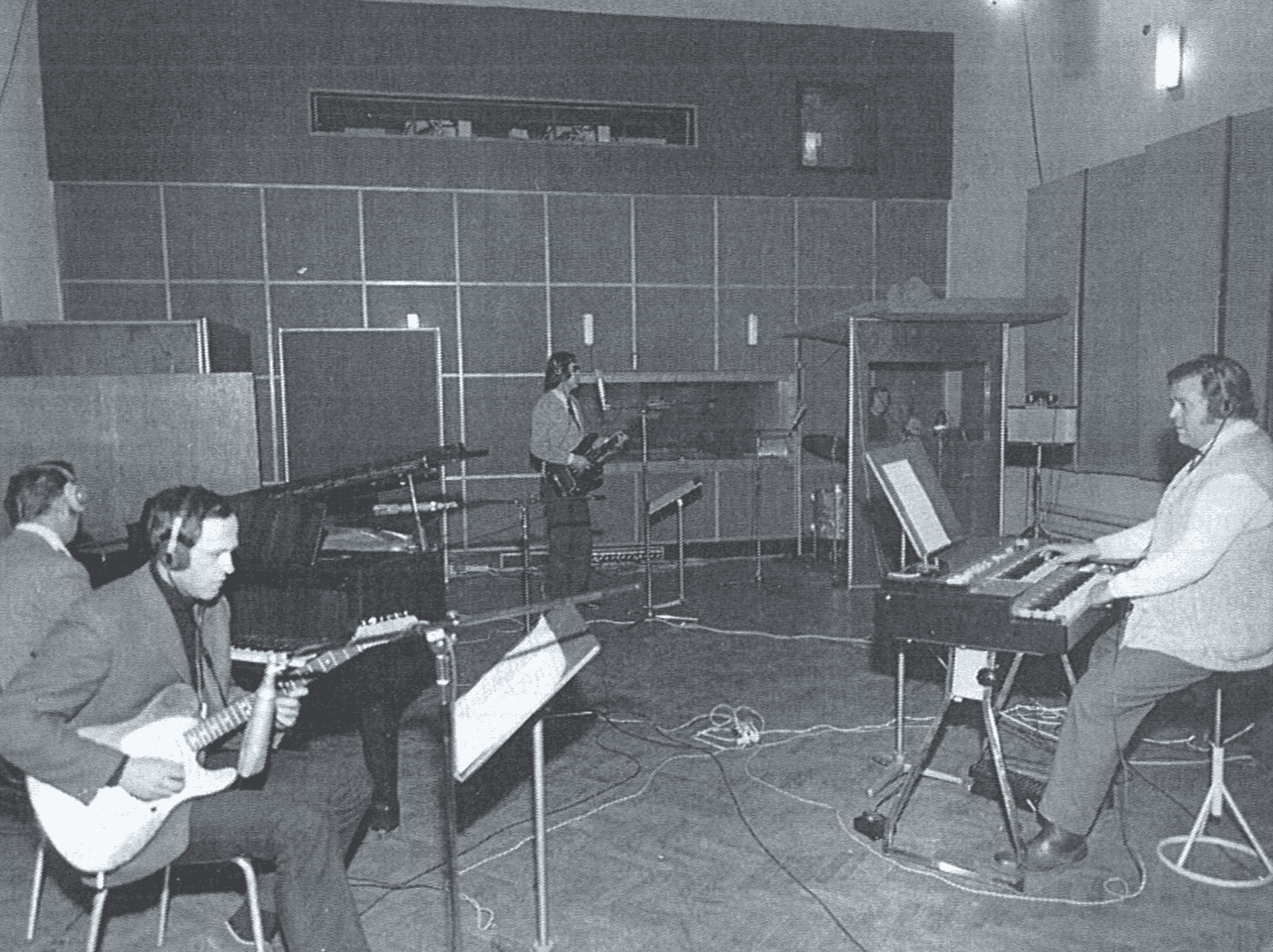 Zagreb musicians pictured at the small sound hall at Jadran film © From the book History of Vinyl Production in Croatia by Veljko Lipovšćak - provided by Croatia Records
Zagreb musicians pictured at the small sound hall at Jadran film © From the book History of Vinyl Production in Croatia by Veljko Lipovšćak - provided by Croatia Records
“The funk sound from here can be really interesting - quite unique. While some bands did try to record this black American music in exactly the style as the Americans did it, many artists from here enjoyed experimenting with the style - in particular some pop artists and progressive rock bands. They took the rhythm and the funk from the American music, but added their own styles – sometimes distinctly Balkan styles – over the top. Boki Milošević and the Belgrade Jazz Orchestra spring to mind immediately.”
Zdravko Čolić - Mujo kuje konja po mjesecu
A giant of Yugoslavian music, Zdravko Čolić's inclusion on Croatia Records Jugoton Funk Vol. 1 is one of the most unusual (and rarest) pieces of music in his back catalogue. It is a funk version of the Bosnian sevdah classic 'Mujo kuje konja po mjesecu (Mujo changes the horseshoe by the moonlight)'. “This is from an extremely rare compilation of pop festival music,” says Dr. Smeđi Šećer. “It's not something you'd come across every day. It was shown to me by a Slovenian DJ colleague. I only ever saw a physical copy of this release maybe two or three times in all my years spent digging.”
The world's largest exporter of music is the United States. The second-largest is the United Kingdom. That these two largest exporters share a common language – and it being one of the world's most widely spoken – is no coincidence. It can be difficult to export music from Croatia and other Balkan nations purely because of the language barrier. People like to understand the text of what they are listening to. Such barriers can be overcome with overtly emotional delivery, such as in the case of folk music like sevdah, but also when the musical style is something relevant to the dancefloor. Especially within a niche international scene like rare funk.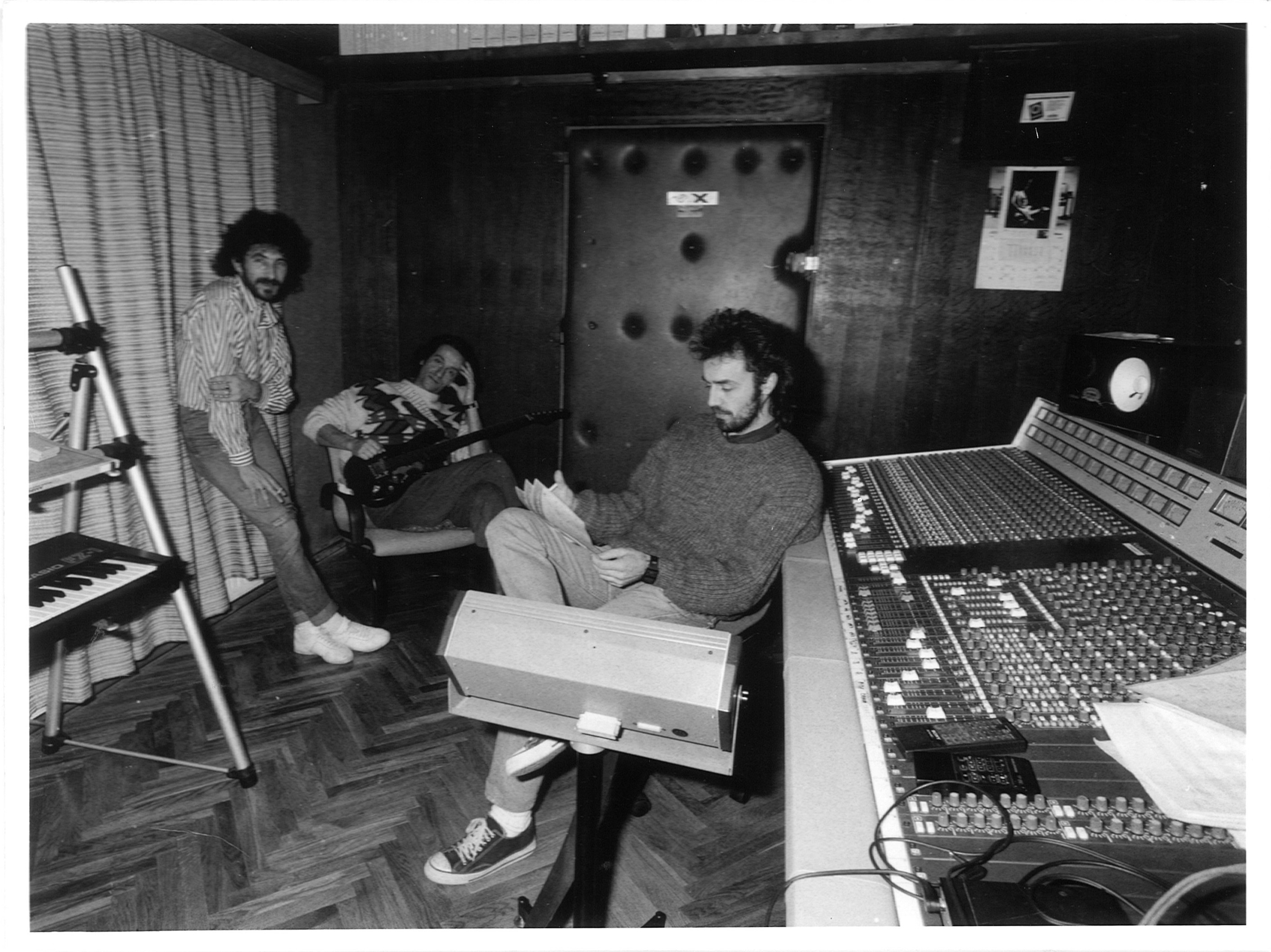 Even after the label stopped being Jugoton and became Croatia Records, famous artists from all the former countries of Yugoslavia would still come to work at the recording studios in Dubrava. In this photo from the early 1990s we see (left to right) Croatian singer Željko Bebek from the Sarajevo-formed Yugoslavian rock giants Bijelo Dugme, Macedonian guitar virtuoso Vlatko Stefanovski from the band Leb i sol and Bosnian singer, guitarist, arranger and producer Nikša Bratoš from the band Crvena Jabuka. Bijelo Dugme was the most popular and best-selling rock band from Yugoslavia. Their first recordings were offered to record label Diskoton in their native Sarajevo. They were turned down, allegedly as the label's release schedule was already full for the following six months. This is widely considered the greatest business mistake in the history of Yugoslav record publishing. On the same day as this refusal, Zagreb's Jugoton snapped the band up for an initial five-year contract © Photo from the Croatia Records archive and licensed for exclusive use within this article by Croatia Records
Even after the label stopped being Jugoton and became Croatia Records, famous artists from all the former countries of Yugoslavia would still come to work at the recording studios in Dubrava. In this photo from the early 1990s we see (left to right) Croatian singer Željko Bebek from the Sarajevo-formed Yugoslavian rock giants Bijelo Dugme, Macedonian guitar virtuoso Vlatko Stefanovski from the band Leb i sol and Bosnian singer, guitarist, arranger and producer Nikša Bratoš from the band Crvena Jabuka. Bijelo Dugme was the most popular and best-selling rock band from Yugoslavia. Their first recordings were offered to record label Diskoton in their native Sarajevo. They were turned down, allegedly as the label's release schedule was already full for the following six months. This is widely considered the greatest business mistake in the history of Yugoslav record publishing. On the same day as this refusal, Zagreb's Jugoton snapped the band up for an initial five-year contract © Photo from the Croatia Records archive and licensed for exclusive use within this article by Croatia Records
“Quite a few of these records are well known among connoisseur collectors outside of ex-Yu countries and they have a high price,” says Dr. Smeđi Šećer. “You can find Yugoslavian funk included on mixtapes by rare funk and hip hop collector DJs from all over the world. I know of one mixtape made by a well-known DJ from New York which uses only music released in the former Yugoslavia. And why shouldn't that be the case? This is the era we live in. You can go out in Zagreb and hear a Croatian DJ play Peruvian psychedelic cumbia music or afrofunk, so there are definitely DJs in the UK, the USA - maybe even Peru - who will play Yugoslavian funk. It's just feel-good dancefloor music that transcends all boundaries.”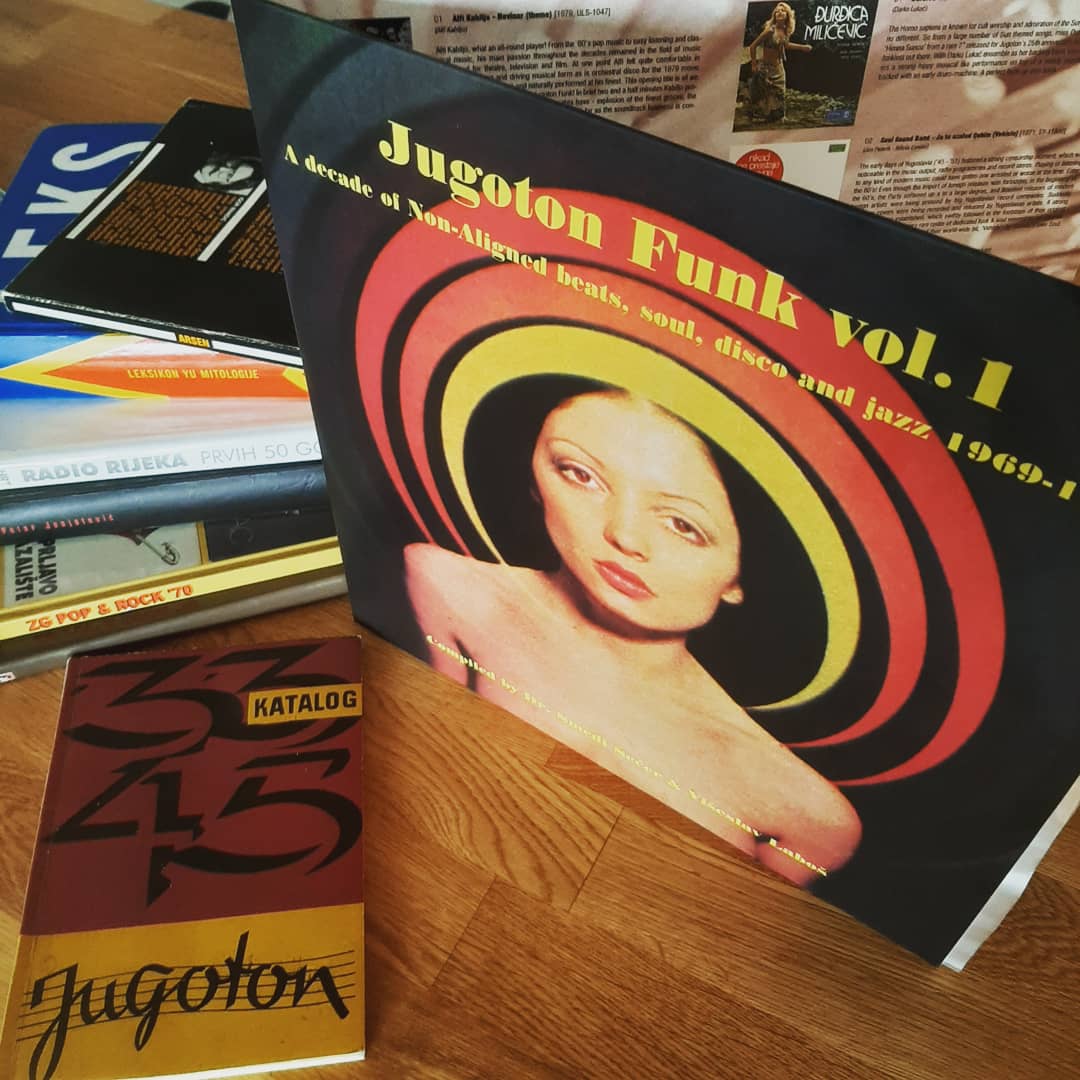
The digital and CD version of Croatia Records Jugoton Funk Vol. will be released shortly by Croatia Records. The extravagantly designed double vinyl album version is out now and was released under license by specialist Dutch vinyl company Everland Music. The last vinyl album produced by Jugoton’s vinyl pressing plant in Croatia was a disc containing the sermons of Pope John Paul II
For the latest travel info, bookmark our main travel info article, which is updated daily.
Read the Croatian Travel Update in your language - now available in 24 languages.


